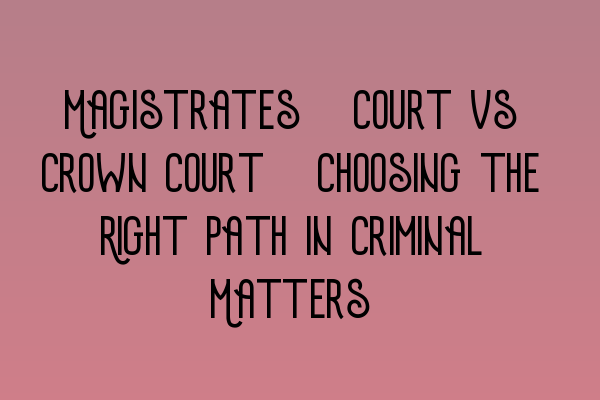Magistrates’ Court vs Crown Court: Choosing the Right Path in Criminal Matters
When facing criminal charges in the UK, it is crucial to understand the differences between the Magistrates’ Court and the Crown Court. These two courts have distinct roles and procedures, and choosing the right path can significantly impact your case. In this article, we will explore the key differences between the Magistrates’ Court and the Crown Court, helping you make an informed decision and ensuring the best possible outcome for your criminal matter.
The Magistrates’ Court: Speed, Simplicity, and Summary Offences
The Magistrates’ Court is the lower level of the UK’s criminal justice system, handling the majority of criminal cases. This court is presided over by a panel of magistrates or a district judge, who possesses the legal expertise to make judgments.
One of the notable advantages of the Magistrates’ Court is its speed in dealing with cases. Compared to the Crown Court, where trials can take weeks or even months, the Magistrates’ Court resolves matters much more quickly. This aspect is particularly beneficial if you need a speedy resolution for minor offences or if you wish to minimize the disruption caused by legal proceedings.
Another characteristic of the Magistrates’ Court is its simplicity. The procedures in this court are generally more straightforward, making it easier for individuals without legal representation to navigate the system. However, it is important to note that seeking professional legal advice is still strongly recommended, especially for complex cases.
Summary offences, which include minor criminal charges such as traffic offences and low-level theft, are primarily dealt with in the Magistrates’ Court. If you are facing a summary offence, your case will usually be resolved in this court, unless you elect for it to be heard in the Crown Court.
If found guilty in the Magistrates’ Court, the judge has the power to impose sentences of up to six months in prison, fines, community orders, or disqualification from driving. For more serious offences, the Magistrates’ Court can refer the case to the Crown Court for sentencing.
The Crown Court: Serious Crimes and Complex Trials
The Crown Court deals with more serious criminal cases, including indictable offences and cases that have been sent from the Magistrates’ Court for sentencing. Indictable offences are more severe in nature, such as murder, rape, serious assaults, and complex fraud cases.
In the Crown Court, trials are heard by a judge and jury, ensuring a fair and impartial process. The involvement of a jury allows for a broader range of perspectives and ensures that decisions are made by a group of individuals representing society.
Crown Court trials typically involve more complex legal arguments and a greater volume of evidence. As a result, these trials tend to be lengthier and require a higher level of legal expertise than those in the Magistrates’ Court. It is often necessary to engage the services of a solicitor who specializes in criminal law to provide an effective defense or prosecution.
If convicted in the Crown Court, the judge has the authority to impose more severe sentences, including imprisonment for an unlimited period and significant fines.
Choosing the Right Path: Factors to Consider
When deciding whether to proceed with a case in the Magistrates’ Court or the Crown Court, several factors should be taken into account:
- Nature of the Offence: Consider the severity of the offence and whether it falls under the jurisdiction of the Magistrates’ Court or the Crown Court.
- Complexity of the Case: Evaluate the evidence and legal arguments involved in your case. If the matter is straightforward, the Magistrates’ Court may be more suitable. For complex cases, the expertise of the Crown Court may be necessary.
- Speed of Resolution: Determine if a quick resolution is essential or if you are prepared to wait for a longer trial process in the Crown Court.
- Representation: Assess whether you require legal representation and consider the expertise of the solicitor you choose. Seek professional advice to ensure you have the best chance of success.
Ultimately, the decision of whether to choose the Magistrates’ Court or the Crown Court should be made after careful consideration of the specific circumstances surrounding your case. Consulting with a criminal solicitor who can provide expert guidance tailored to your situation is highly recommended.
To learn more about criminal law in the UK and related legal topics, feel free to explore the following articles:
- Legal Representation for Delaware LLCs in the UK: Expert Advice
- Ensuring Ethical Business Practices: Delaware’s Code of Conduct
- Legal Challenges for UK Businesses in the U.S.: Strategies for Overcoming Hurdles
- UK Criminal Law: An In-Depth Analysis of the British Legal System
- Legal Challenges for UK Businesses in the U.S.: Strategies for Overcoming Hurdles
